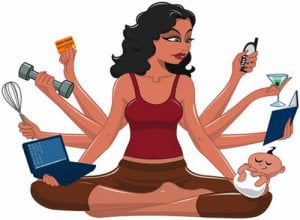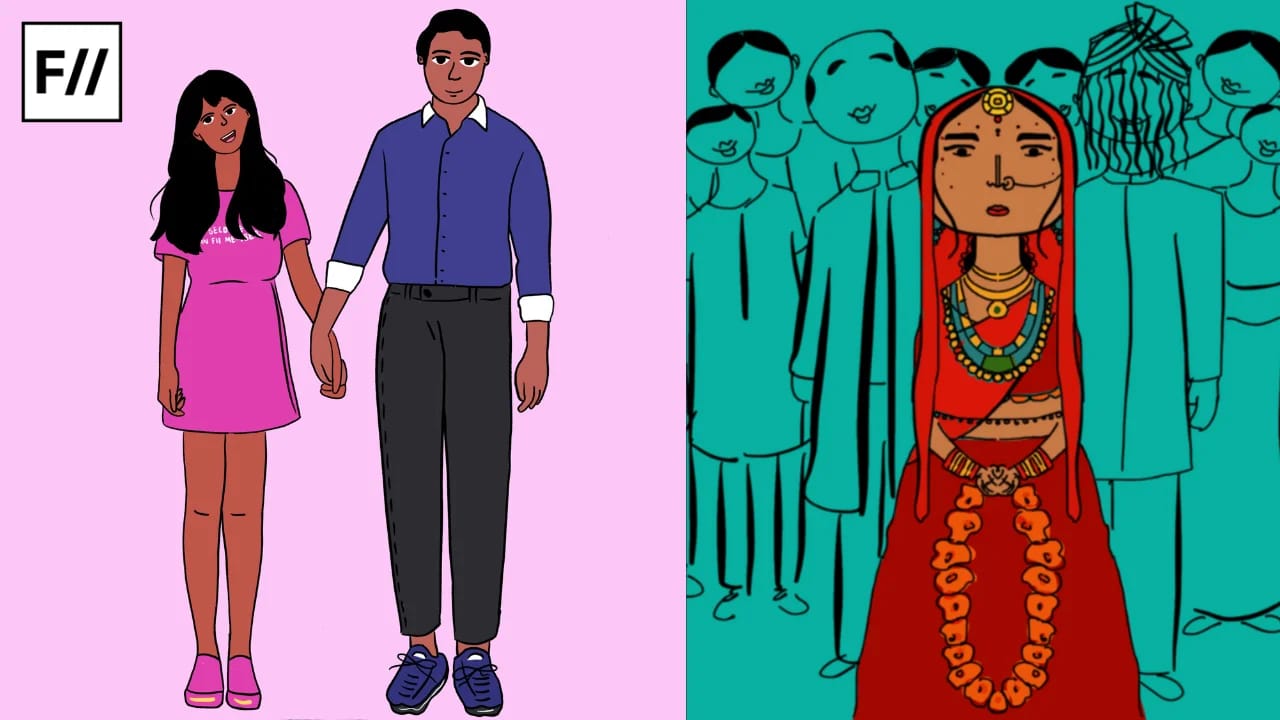I always wonder, is ‘Fatherhood’ as famous a concept as ‘Motherhood’? No points for guessing. Motherhood is an overrated concept in our society. Being a mother is like being in a position where a thousand people are considering you for a performance appraisal. These judgments are not always behind sealed lips and staring eyes. Here are a couple of questions and comments that I encounter almost on an everyday basis (I am not exaggerating) by men and women alike. They reek of patriarchy and its time we recognized that.
1. You don’t look like a mom of two kids. What do you do to stay young?
The question nests the bias that a mother has to be a certain age and secondly, that after two kids, she must look a certain way. And that presumes that every thought of mine and every action I take is necessarily in the direction of nurturing my family and not for myself particularly. So far as the age question is concerned, I think society has a problem with women at every age. If I marry at 21, people ask, “Why so early?”. If I’d done this at 30, they’d have said “Why so late?”. I am curious to find this invisible, mysterious measuring scale based on which people rate the early-late of getting married, having kids, or for that matter anything a woman decides to do.
If I marry at 21, people ask, “Why so early?”. If I’d done this at 30, they’d have said “Why so late?”
Bollywood, as it pokes into many ills prevailing in the society, is a pioneer in perpetuating stereotypical images of mothers. The advertising world is another contender for the winning position here. “Do baccho ki maa?” (Mother of two kids) is a very common phrase used in movies to portray how this woman dresses up in a way to hide her flaws, and enhances herself through jewellery, eats anything because she is forever hungry, is devoid of any sexuality and fulfills the primary role of ‘raising a family’.
On the other hand, the same media strengthens this image by presenting a flashy image of celebrity mothers by following their gym routine to what they eat and what not. The result is a glorified body that is ‘flaw’ less to put every other non-celebrity mother to shame and guilt and eventually fill them with an aspiration to ‘get-back-to-shape’ as soon as possible.
2. How do you achieve work-life balance?
On one hand, if I were to balance, I’d be judged as a mother who is doing nothing well. You’ve all heard those aunties and uncles in the parks who would comment on how today’s generation of mothers are raising wild kids who don’t know how to ‘behave’ because of course, the mothers are busy and they don’t have time to raise their kids.
 Explicit categories of working and ‘non-working’ mothers are fabricated by the media to spark ideological debates of who makes for a better mother. Although it is no rocket science to understand that the patriarchal society leaves no scope for a ‘non-working’ mother to exist. And irrespective of whichever category you fall into, you’ll be ridiculed from time to time by the elderly around and the school teachers of your kids on your ‘mothering’ skills (hyped as parenting skills).
Explicit categories of working and ‘non-working’ mothers are fabricated by the media to spark ideological debates of who makes for a better mother. Although it is no rocket science to understand that the patriarchal society leaves no scope for a ‘non-working’ mother to exist. And irrespective of whichever category you fall into, you’ll be ridiculed from time to time by the elderly around and the school teachers of your kids on your ‘mothering’ skills (hyped as parenting skills).
Is it a coincidence that this notion works like a brahmastra for organizations to charge the ‘motherhood penalty’. “You won’t get promotion, because you’re (going to be) a mother”, “We can’t hire you because you are pregnant”, “You should not take up this job/position because you have little kids”. All of these are a part of the motherhood tax, but of course as a mother you cannot question it, because the candy of work-life balance is slipped into your pocket not theirs. And so when I multitask, basically I am bad at everything – work and life!
Coming back to the irony of multitasking, the other side of the coin is that while multitasking is presented as a skill worth acquiring and one should engage into ‘lifelong learning’ to attain it, it is introduced to you in the first place as ‘the order of nature’. As if, by virtue of possessing a vagina, you were to know how to multitask. And so, if I were to fail at multitasking, then well, I am a bad mother anyway!
The notion of work-life balance works like a brahmastra for organizations to charge the ‘motherhood penalty’.
3. Does your husband help you with the household chores?
The narrative considering a husband as ‘not-the-primary caregiver’ is a thoughtfully crafted one in any patriarchal society. There seems to be a change in times from never contributing to care for a child as it isn’t a ‘manly’ enough task, to today, when husbands actively ‘help’ in the household by occasionally cooking, doing the dishes, changing diapers and taking care of the child in the absence of the mother. Though the latter is a reality only for one-third of the Indian population, for whosoever it is, it largely remains a sphere where the husband ‘braves’ the act in the garb of a helper, and gets extra points for all the little efforts he makes.
Unless he’s a nanny who is earning to take care of someone else’s children, I think the word we’re looking for is ‘responsible’ and not ‘supportive’. Nobody tells a mother to change the diapers, but she does. Similarly, nobody should have to ‘tell’ a husband to cook; to direct as to where the formula milk ingredients are, or what vaccination is scheduled etc.,. If this were the way things work, I and my husband would be responsible of making sure things run smoothly in the house and making sure our kids are okay. Neither him nor I should have any interest whatsoever in applauding either one of us for providing the basic necessities to our very own family.
4. Aww! Motherhood must make you so full of emotions!
Not really! And I recently came up with a more elaborate response: While progesterone, estrogen, adrenaline are hormones, MOTHERHOOD IS NOT! Am I obsessed about feeding my children? No, I don’t and I don’t know why I should. Because “Bacha khana kha le to maa ka bhi pet bhar jata hai?” (If the child has eaten then the mother’s hunger is content too?) No, sorry. I have an appetite separate from my child. Were mothers not born with hunger instincts? At least thats what I read in my biology classes.
From Kajol running after her child with a dabba (lunchbox) to feed him in an upcoming movie – Helicopter Eela to innumerable ads on “Maa ke haath ka khaana” (Food cooked by mother) directed to leave you teary-eyed, everyone is hell-bent on mixing up mothers, food and emotions. Also, do my children go ga-ga about the food I cook? Not always. My children love what their Dad cooks, also what the neighbour aunty cooks, and what the uncle on the other floor cooks, and what the pizza restaurant serves, so why put me in the limelight or should I say ‘line of fire’?
Certainly food is not the only site of emotions. Worrying constantly about children is another trait most expected of the ‘concerned’ mother. For if you don’t do that, what kind of a mother are you? If it doesn’t pain you every time your child falls down and gets hurt, if you don’t cry every time you speak harshly to your child. If you don’t do all this, then you lack mamta (maternal love) and are a cold hearted mother.
5. As mothers, aren’t we the epitome of sacrifice?
Motherhood is stereotyped all across the world, but the sacred connotation that Indian-ness attaches to it can’t easily be matched. “India is our mother”, “Cow is our mother”, “Ma Bhagwan ka roop hoti hai” (Mother is a reflection of the God) are some of the ways in which we get one message: Mothers are supposed to give, and give more; and do so selflessly. And hence, sacrifice is a virtue that you acquire by being tagged as a ‘mother’.
#MaaNahiBhoolti was a popular hashtag this Mother’s Day to glorify that irrespective of the care (or lack of it) that children exhibit towards the mother, she will still be overflowing with emotions for her children. And this is not an exception but a thumb rule when it comes to the relationship of mother and child. This puts mothers at a disadvantageous position – not demanding their rights during family feuds over property, not voicing their opinions when it comes to how they would like to live and also holding themselves back if they face or witness injustice within their family. For her, its important to be the ‘nurturer’ and not the ‘destroyer’ of the family.
The Politics of Motherhood

Image source: indiandenfencenews.in
Outlined above are the ways that sacrifice for and by mothers is normalized in society. This notion is then used by dominant politics. Electoral campaigns are run in the name of providing ‘safety to our mothers’, wars are fought in the attempt to save our ‘mother nation’ and lynching is carried out in the name of ‘mother cow’. All I would want to say to these political players is – Please, #NotInMyName.
Also Read: How Companies Are Complicit In Hiring Discrimination Against Women
Featured image source: Scary Mommy





So very true Asmita…I could relate to it. Every word is as if I’m narrating my life … gosh! These questions are so very part of life now
Superb article. Thank you for writing this.